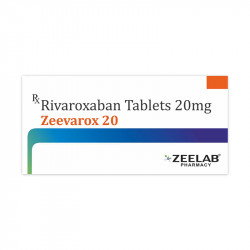Download India's most affordable pharmacy app
- Compare with medicine prices
- Save upto 90% on your medicine bills
COMPOSITION:
Rivaroxaban (20mg)DESCRIPTION:
Introduction
Ricosprin 20 Tablet is a medication primarily used for its anti-inflammatory and anti-thrombotic properties. It contains the active ingredient, Aspirin, which is commonly used to reduce inflammation, fever, and pain. In addition to these benefits, it helps in preventing blood clots and is often prescribed for individuals with cardiovascular conditions. It is most commonly used for preventing heart attacks, strokes, and managing conditions like rheumatoid arthritis and osteoarthritis.
Uses of Ricosprin 20 Tablet
Ricosprin 20 Tablet is used for:
- Reducing pain, fever, and inflammation
- Preventing blood clots and improving blood circulation
- Lowering the risk of heart attack, stroke, and other cardiovascular diseases
- Managing symptoms of rheumatoid arthritis, osteoarthritis, and other inflammatory conditions
How Ricosprin 20 Tablet Works
Ricosprin 20 Tablet works by inhibiting the enzyme cyclooxygenase (COX), which is responsible for the formation of prostaglandins, substances that mediate inflammation, pain, and fever. By blocking COX, Ricosprin reduces the production of these substances, providing relief from pain and inflammation. Additionally, aspirin prevents blood platelets from clumping together, reducing the likelihood of clot formation and improving cardiovascular health.
Benefits of Ricosprin 20 Tablet
The benefits of Ricosprin 20 Tablet include:
- Effective in managing pain, fever, and inflammation
- Prevention of blood clots, reducing the risk of heart attack and stroke
- Helps reduce the risk of cardiovascular diseases
- Improves mobility and reduces symptoms in conditions like arthritis
How to Take Ricosprin 20 Tablet
Follow your doctor's instructions for taking Ricosprin 20 Tablet. The general dosage guidelines are as follows:
- Take one tablet by mouth with water, usually once or twice a day, as prescribed by your healthcare provider.
- Do not crush or chew the tablet. Swallow it whole.
- It is recommended to take the tablet with food to minimize the risk of stomach irritation.
- Adhere to the prescribed dosage and take it at the same time each day for better results.
Side Effects of Ricosprin 20 Tablet
Common side effects may include:
- Stomach upset or indigestion
- Heartburn
- Headache
- Dizziness
- Rash
Serious side effects, though rare, may include gastrointestinal bleeding, ulcers, and allergic reactions. Seek immediate medical attention if you experience symptoms like unusual bruising, prolonged bleeding, severe stomach pain, or allergic reactions (difficulty breathing, swelling of the face, lips, or throat).
Safety Advice
Consider the following precautions when taking Ricosprin 20 Tablet:
- Do not take if you have a history of gastrointestinal bleeding, peptic ulcers, or bleeding disorders.
- Consult your doctor if you are pregnant, planning to become pregnant, or breastfeeding.
- Inform your doctor of any other medications you are taking, especially blood thinners, other anti-inflammatory drugs, or medications for heart conditions.
- Avoid alcohol consumption as it may increase the risk of stomach bleeding.
- Take with caution if you have a history of liver or kidney disease.
Frequently Asked Questions
Q: Can I take Ricosprin 20 Tablet with other medications?
A: It is essential to consult your doctor before combining Ricosprin 20 Tablet with other medications, particularly blood thinners or other anti-inflammatory drugs, as interactions may occur.
Q: What should I do if I miss a dose of Ricosprin 20 Tablet?
A: If you miss a dose, take it as soon as you remember, unless it is nearly time for your next dose. In that case, skip the missed dose and continue with your regular schedule. Do not take two doses to make up for the missed dose.
Q: Can Ricosprin 20 Tablet be taken during pregnancy?
A: Ricosprin should be used during pregnancy only if clearly needed and prescribed by your healthcare provider. It is generally avoided during the third trimester due to potential risks to the baby.









 Added!
Added!